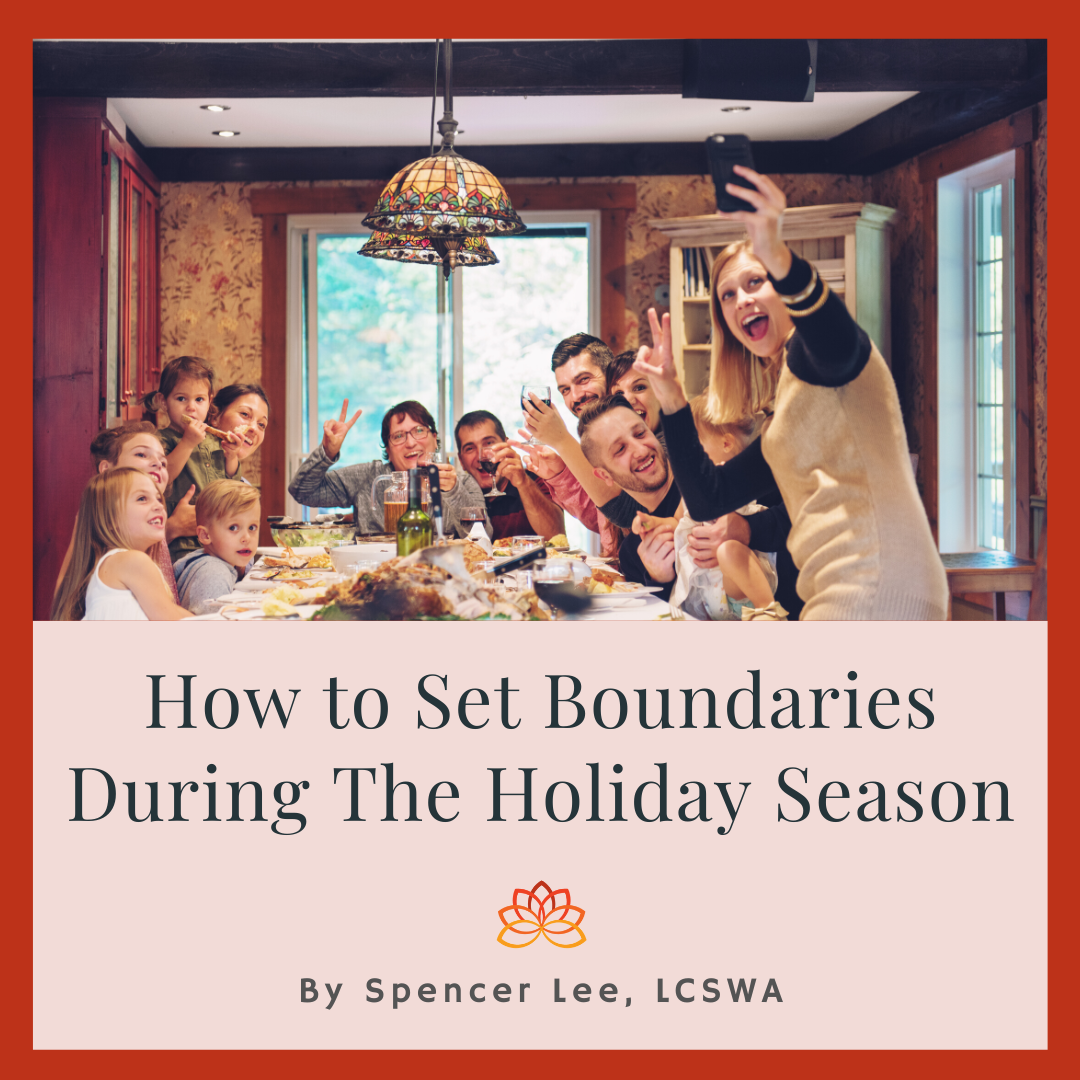How to Set Boundaries During the Holiday Season
by Spencer Lee, LCSWA

For most people, or so it seems through movies and social media, the holidays are full of joy, wonder, and family. We’ve all seen those clips of people gathered around a tree or dinner table, laughing, and appearing carefree. But in reality, holidays are often stressful- traveling, taking off from work, managing finances, wrangling kiddos, and often struggling through interactions with family when we don’t see eye to eye.
The American Psychological Association found that during the holiday season, 38% of people reported higher stress levels while only 8% said they felt happier. This is not to say that we can’t join that 8%, because in fact, we can even change this statistic, and the key is to set boundaries.
What are boundaries and why are they important?
“Boundaries are the distance at which I can love you and me simultaneously.”
– Prentis Hemphil
Boundaries are a set of guidelines and expectations that we hold for ourselves and others that clearly express how we will act or be treated. Science of People explains that boundaries define “what we will say ‘yes’ to and what we say ‘no’ to”- that they free us from the expectations of others. For example, a common work/life boundary is that someone may choose not to answer emails while out of the office. Boundaries are inherently relational because it not only sets a clear expectation for us, but it also sends a message to others. This example sets the expectation that emails are not to be answered when out of the office and also sends a message to others making them aware of this change.
Setting boundaries is one of, if not the most important, acts of self-care we can participate in. Setting boundaries helps us to decrease stress, avoid burnout, reduce conflict, increase our self-esteem, improve our relationships, and prevent emotional or financial burdens. It’s helpful to remember that boundaries can be set around any area of our life (relationships, work, time, food, social media, money, personal space, etc).
How exactly do we set boundaries?
1. Sometimes it’s hard to know where to start with boundaries, especially if we aren’t used to setting them. It can be useful to think back on past experiences of conflict or times where feelings of resentment have been present. Conflict and resentment act as guides, pointing us in the direction where boundaries may be needed to improve relationships and our own mental health.
2. Decide on what and who the boundary needs to be set with. This might look like setting a boundary with family members about respecting your pronouns, not commenting on weight/eating habits, or staying away from talking politics.
3. Communicate your boundaries. A great recipe for boundaries looks something like “I will/can/ am able to _______. I am not able/going to ______. If ______ happens, I will ________”.
Here are some examples of how we can express our boundaries to others.
- “I am not the right person to share that with”
- “I will only respond to my pronouns and name. If you do not use my pronouns/name, I will be leaving.”
- “I am not able to attend Christmas this year. I will be able to visit next month.”
- “I am not comfortable engaging in conflict this year. I will not be participating in conversations about x,y,z”
- “Due to my finances, I am not able to get a gift this year. Here is what I can do instead”
- “I am only able to stay for 2 hours”
- “I’m not okay with hugging, but I’m happy to shake hands”
What happens if someone crosses my boundary?
One of the best phrases I’ve heard in life so far is, “the people who respond negatively when a boundary is set benefitted from you having no boundaries.” Many people are happy to respect our boundaries once we express them. Some may have negative reactions such as complaints or guilt trips that are used as an attempt to manipulate us.
The key here is to maintain your boundary, hold your ground, and remember it is normal to experience guilt when you are not used to setting boundaries. Here, you can read more about tips for experiencing guilt and navigating what that means. Experiencing guilt or conflict from others after setting boundaries can make us feel like we made the wrong choice. However, holding to our boundaries improves our relationships by teaching others how we deserve to be treated. The more frequently we express and maintain our boundaries, the more likely others are to respect them.
The holidays are stressful enough. Setting boundaries can help put us in that 8% of people who do experience greater happiness during the holiday season. We can use a boundary setting to manage stress, reduce conflict, create fulfilling relationships, and ultimately care for ourselves so that we can experience the joy, wonder, and carefree feeling of the holiday season!
For more information about handling the holidays like a pro, check out The Family Center’s ideas!
